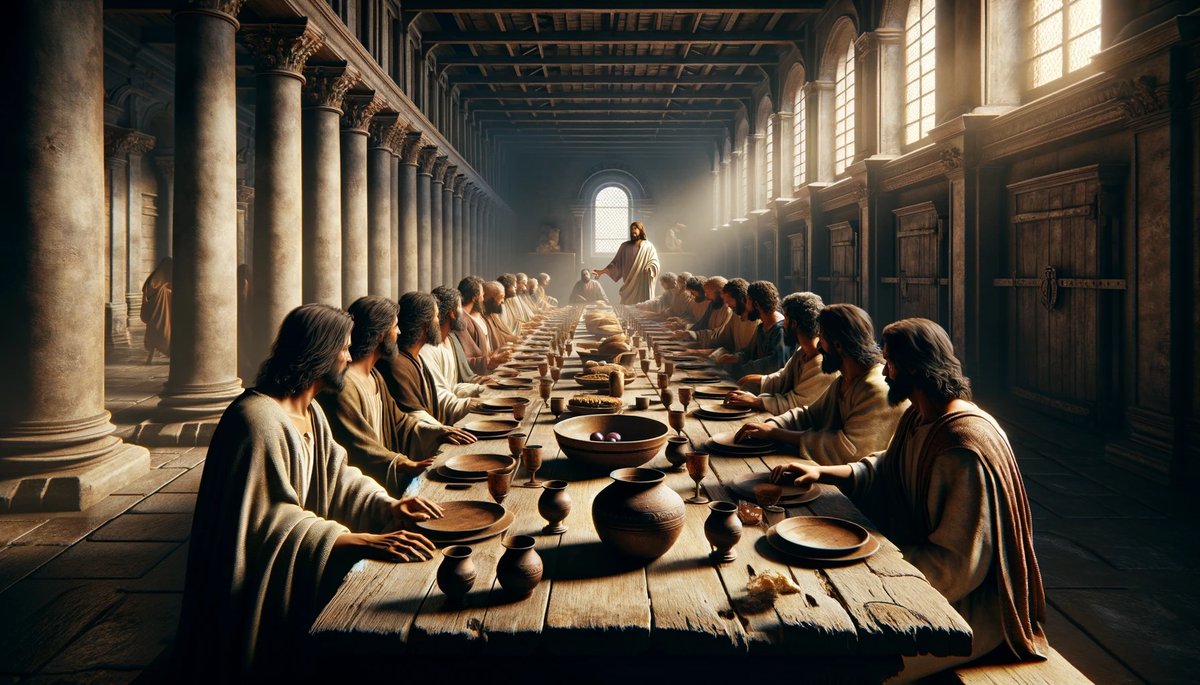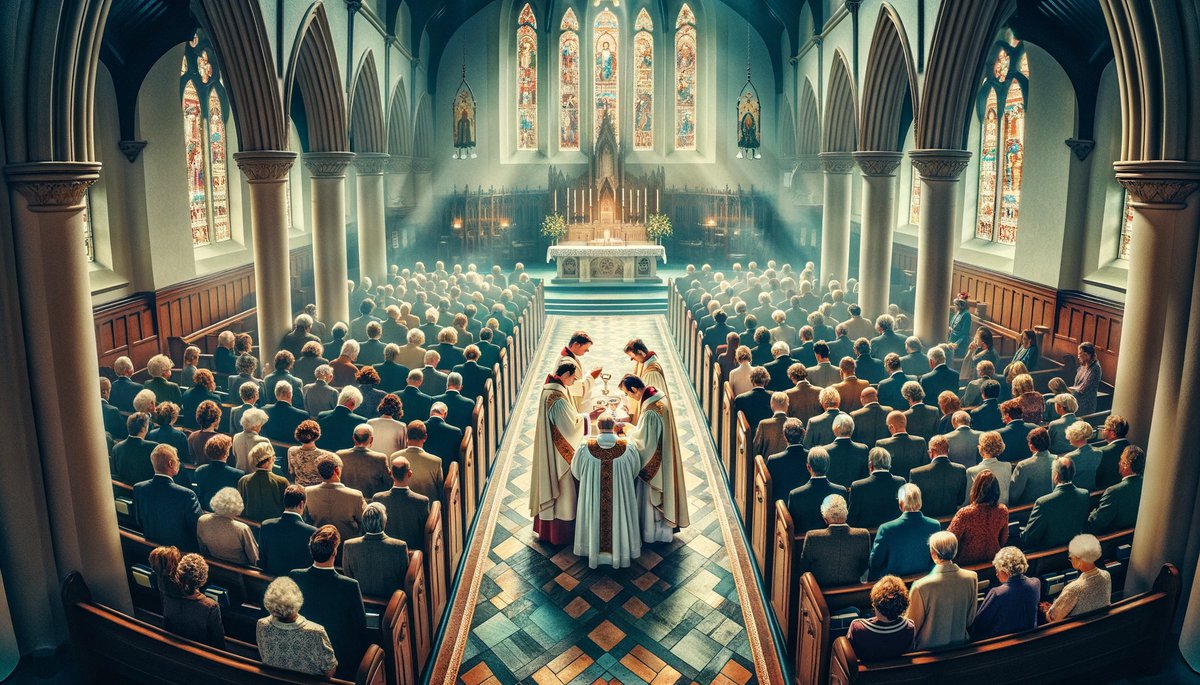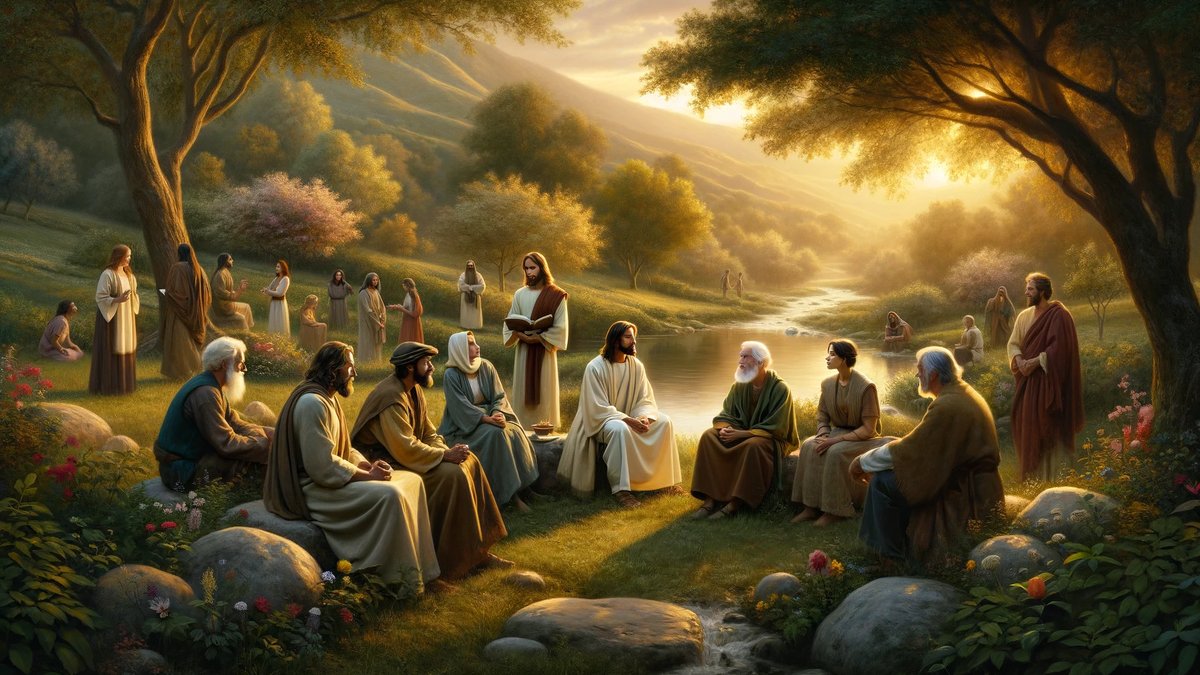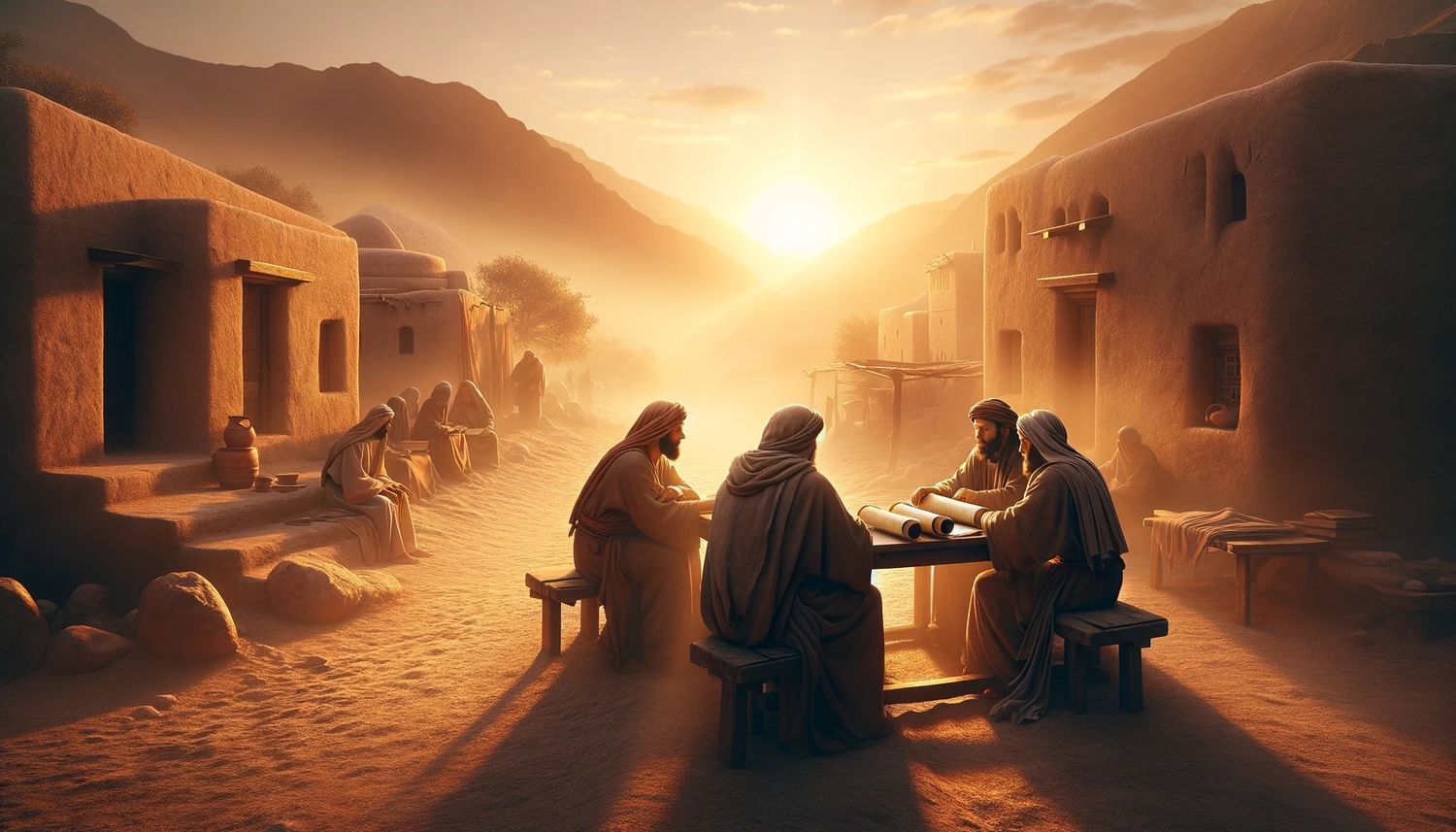Home>Theology and Spirituality>Why Is It Called Communion


Theology and Spirituality
Why Is It Called Communion
Published: February 19, 2024
Peter Smith, Editorial Director at Christian.net, combines deep insights into faith, politics, and culture to lead content creation that resonates widely. Awarded for his contributions to religious discourse, he previously headed a major organization for religious communicators, enhancing dialogue on faith's societal impacts.
Discover the significance of the term "communion" in theology and spirituality. Explore the origins and meaning behind this sacred practice.
(Many of the links in this article redirect to a specific reviewed product. Your purchase of these products through affiliate links helps to generate commission for Christian.net, at no extra cost. Learn more)
Table of Contents
Introduction
The term "communion" holds profound significance in various religious and spiritual traditions, evoking a sense of unity, connection, and sacredness. It is a concept that transcends linguistic and cultural boundaries, resonating deeply with individuals seeking spiritual nourishment and community. In this article, we will delve into the origins, meanings, and practices associated with communion, exploring its rich tapestry of symbolism and ritual.
Communion, in its essence, embodies the idea of coming together in a shared experience of spiritual significance. Whether expressed through the act of partaking in a sacred meal, sharing in a collective prayer, or engaging in a symbolic ritual, communion serves as a unifying force that binds individuals to a higher purpose and to one another. The multifaceted nature of communion invites us to explore its historical roots, its diverse interpretations, and its enduring relevance in contemporary religious and spiritual contexts.
As we embark on this exploration, we will unravel the etymology of the term "communion" and uncover its deep-seated meanings across different belief systems. From the early origins of communion in ancient rituals to its modern-day expressions in various religious traditions, we will illuminate the universal themes of fellowship, spiritual nourishment, and divine connection that underpin the concept of communion.
Join us on this enlightening journey as we unravel the layers of symbolism and significance woven into the fabric of communion, gaining a deeper understanding of its timeless relevance and its profound impact on the human experience of spirituality and community.
Read more: Why Is It Called Lent?
The Origin of the Term "Communion"
The term "communion" traces its etymological roots to the Latin word "communio," which denotes a sense of sharing, participation, and mutual fellowship. This linguistic foundation encapsulates the essence of communion as a communal act of sharing in something sacred and transcendent. The concept of communion has ancient origins, with its fundamental principles deeply embedded in religious and spiritual practices across diverse cultures.
In the Christian tradition, the term "communion" is intricately linked to the Last Supper, a pivotal event in the life of Jesus Christ. During this sacred meal, Jesus shared bread and wine with his disciples, symbolizing his body and blood, and imparted the profound message of unity and spiritual nourishment. The act of partaking in this symbolic meal became known as the "Lord's Supper" or "Holy Communion," signifying the believers' participation in the divine sacrifice and their interconnectedness as members of the Christian community.
Similarly, in the context of the Catholic faith, "communion" refers to the reception of the Eucharist, wherein the faithful partake in the consecrated bread and wine, believing in the real presence of Christ. This act of communion symbolizes the intimate union with Christ and fellow believers, fostering a sense of spiritual communion with the divine and the community of believers.
Beyond Christianity, the concept of communion manifests in various forms across different religious traditions. In Hinduism, the practice of "prasad" involves the sharing of sanctified food as a means of receiving blessings and fostering a sense of unity among devotees. In Buddhism, the act of offering alms to monks and partaking in communal meals embodies the spirit of communion, emphasizing generosity, interconnectedness, and spiritual fellowship.
Moreover, indigenous spiritual practices often incorporate communal rituals centered around the sharing of food, prayers, and sacred ceremonies, reflecting a deep reverence for communal harmony and spiritual interconnectedness.
The term "communion" transcends linguistic and cultural boundaries, embodying the universal human longing for connection, shared experience, and spiritual unity. Its origins, deeply rooted in the collective consciousness of humanity, reflect the innate desire to partake in something greater than oneself and to forge meaningful connections with the divine and fellow beings.
In essence, the term "communion" encapsulates the timeless yearning for communion with the sacred, the communal celebration of spiritual interconnectedness, and the enduring legacy of shared rituals that bind individuals and communities across time and space.
The Meaning and Significance of Communion
At its core, communion embodies a profound sense of unity, spiritual nourishment, and interconnectedness. It serves as a symbolic and experiential expression of the human longing for communion with the divine and with one another. The act of communion transcends mere physical sustenance; it encompasses the sharing of sacred moments, the affirmation of shared beliefs, and the cultivation of a collective identity within religious and spiritual communities.
Communion holds multifaceted meanings across different traditions, yet its fundamental significance revolves around the themes of unity, fellowship, and spiritual sustenance. In the Christian context, communion symbolizes the intimate union with the divine and the community of believers. The partaking of the Eucharist or the sharing of the Lord's Supper represents a sacred bond with Christ and fellow believers, fostering a profound sense of spiritual communion and solidarity.
Furthermore, communion serves as a transformative and deeply personal experience for individuals, offering a moment of spiritual reflection, renewal, and connection. It provides a sacred space for believers to commune with the divine presence, seek forgiveness, and reaffirm their faith, thereby nurturing a deeper sense of spiritual fulfillment and inner peace.
The act of communion also carries profound symbolic significance, representing the sacrificial love, unity, and selflessness exemplified by spiritual figures and revered ancestors. It serves as a tangible reminder of the enduring values of compassion, service, and communal harmony, inspiring individuals to embody these virtues in their daily lives and relationships.
Moreover, communion fosters a sense of belonging and shared purpose within religious communities, strengthening the bonds of fellowship and mutual support. It creates a sacred space for individuals to come together, celebrate their shared beliefs, and partake in rituals that affirm their collective identity and spiritual journey.
In essence, communion transcends the boundaries of language, culture, and belief, resonating with the universal human yearning for connection, spiritual nourishment, and communal celebration. Its significance lies in its ability to unite individuals in a shared experience of the sacred, fostering a profound sense of belonging, spiritual fulfillment, and interconnectedness within the tapestry of human experience.
Communion in Different Religious Traditions
Communion, in its diverse manifestations, holds a central place in various religious traditions, serving as a unifying force that fosters spiritual connection and communal celebration. Across different faiths, the concept of communion embodies the timeless themes of fellowship, sacred sharing, and spiritual nourishment, reflecting the universal human longing for unity and divine connection.
In the Christian tradition, communion finds expression through the sacrament of the Eucharist, also known as the Lord's Supper or Holy Communion. This sacred ritual holds profound significance as believers partake in the consecrated bread and wine, symbolizing the body and blood of Christ. The act of communion in Christianity signifies the intimate union with Christ and fellow believers, fostering a sense of spiritual communion and solidarity within the Christian community.
In the Catholic faith, the reception of the Eucharist represents a deeply reverent act of communion with the divine, emphasizing the real presence of Christ in the consecrated elements. This spiritual practice serves as a source of nourishment for the soul, fostering a profound sense of unity and spiritual interconnectedness among the faithful.
In Hinduism, the practice of communion is embodied in the concept of "prasad," which involves the sharing of sanctified food as a means of receiving blessings and fostering a sense of unity among devotees. The act of partaking in prasad symbolizes the communal celebration of divine grace and the interconnectedness of all beings within the sacred cosmos.
Similarly, in Buddhism, the act of offering alms to monks and partaking in communal meals reflects the spirit of communion, emphasizing generosity, interconnectedness, and spiritual fellowship. These communal rituals serve as a manifestation of the Buddhist principle of interconnectedness, fostering a sense of shared spiritual nourishment and communal harmony.
Moreover, indigenous spiritual traditions often incorporate communal rituals centered around the sharing of food, prayers, and sacred ceremonies, reflecting a deep reverence for communal harmony and spiritual interconnectedness. These rituals embody the universal themes of unity, reciprocity, and reverence for the interconnected web of life, fostering a profound sense of communion with the natural world and the divine presence.
In essence, communion in different religious traditions transcends cultural and linguistic boundaries, embodying the universal human longing for spiritual connection, shared celebration, and communal harmony. It serves as a testament to the enduring significance of communion as a unifying force that binds individuals and communities across diverse belief systems, fostering a profound sense of interconnectedness and spiritual nourishment.
The Practice of Communion Today
In contemporary society, the practice of communion continues to hold profound significance across diverse religious and spiritual contexts, serving as a timeless expression of unity, spiritual nourishment, and communal celebration. In the Christian tradition, the sacrament of communion remains a central pillar of worship and spiritual sustenance for millions of believers worldwide. The act of partaking in the Eucharist or the Lord's Supper serves as a sacred moment of communion with the divine, fostering a deep sense of spiritual connection and solidarity within Christian communities.
Furthermore, the practice of communion extends beyond formal religious settings, finding expression in various communal gatherings, interfaith ceremonies, and spiritual retreats. In an increasingly interconnected world, individuals from different cultural and religious backgrounds come together to share in moments of spiritual communion, embracing the universal values of compassion, unity, and shared humanity.
Moreover, the concept of communion has evolved to encompass virtual and online platforms, where individuals can participate in collective prayers, sacred rituals, and spiritual discussions, transcending geographical boundaries and fostering a global sense of interconnectedness and shared spiritual experience.
In addition, the act of communal sharing and fellowship remains a cornerstone of many religious and spiritual communities, as believers come together to partake in sacred meals, engage in acts of service, and celebrate their shared values and beliefs. These communal practices serve as a testament to the enduring relevance of communion as a unifying force that transcends differences and nurtures a profound sense of spiritual nourishment and interconnectedness.
In essence, the practice of communion today reflects the universal human longing for connection, spiritual sustenance, and communal celebration, transcending the boundaries of language, culture, and belief. It serves as a timeless expression of the human spirit's quest for unity, compassion, and divine connection, fostering a profound sense of belonging and shared purpose within the tapestry of human experience.
Read more: Why Are The Gospels Called The Gospels
Conclusion
In conclusion, the term "communion" encapsulates the universal human longing for connection, spiritual nourishment, and communal celebration. Its origins, deeply rooted in the collective consciousness of humanity, reflect the innate desire to partake in something greater than oneself and to forge meaningful connections with the divine and fellow beings. The concept of communion holds profound significance across diverse religious and spiritual traditions, serving as a unifying force that fosters spiritual connection and communal celebration.
From its etymological roots in the Latin word "communio" to its diverse manifestations in Christianity, Hinduism, Buddhism, and indigenous spiritual practices, communion embodies the timeless themes of fellowship, sacred sharing, and spiritual nourishment. Whether expressed through the act of partaking in a sacred meal, sharing in a collective prayer, or engaging in a symbolic ritual, communion serves as a unifying force that binds individuals to a higher purpose and to one another.
The practice of communion today continues to hold profound significance across diverse religious and spiritual contexts, serving as a timeless expression of unity, spiritual nourishment, and communal celebration. In an increasingly interconnected world, individuals from different cultural and religious backgrounds come together to share in moments of spiritual communion, embracing the universal values of compassion, unity, and shared humanity. The act of communal sharing and fellowship remains a cornerstone of many religious and spiritual communities, as believers come together to partake in sacred meals, engage in acts of service, and celebrate their shared values and beliefs.
In essence, communion transcends the boundaries of language, culture, and belief, resonating with the universal human yearning for connection, spiritual nourishment, and communal celebration. Its significance lies in its ability to unite individuals in a shared experience of the sacred, fostering a profound sense of belonging, spiritual fulfillment, and interconnectedness within the tapestry of human experience. As we reflect on the profound meanings and enduring relevance of communion, we are reminded of the timeless wisdom it imparts – the wisdom of unity, compassion, and the sacred interconnectedness of all life.














